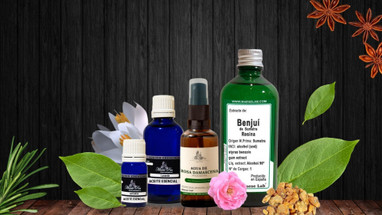Posted by - 24.01.20.
Formula for making Professional Perfumes
Formula Ingredients
Ingredients for making perfumes
With this formula you get a 100 ml perfume.
- Alcohol:.................................... 60 ml
- Propanediol: ........................20 ml
- Castor Oil or Vegetable Glycerin: ......05 ml
- Tincture: ..................................... 10 ml
- Essential Oils: ...................05 ml
Method of preparation
Preparation of Ingredients
First, the essential oils are mixed in a small glass container and left to stand for two hours.
Then the castor oil is added and mixed until a homogeneous appearance is obtained. Next, the tincture is added and stirred until everything is incorporated.
In another container, mix the alcohol and propanediol and let stand for 30 minutes.
When this time has passed, the first mixture is incorporated into the second mixture, stir well until everything is integrated and leave it in the refrigerator for two days (the cold will make the molecules of the components marry together).
After 48 hours, filtered with absorbent cotton and bottled in a spray bottle, the perfume is ready to be used.
Why are dyes important in a perfume?
When we want to elaborate a perfume we have to take into account the ingredients that we are going to use, those that have been put in the list above are the necessary and basic ones, but each one has its moment, its proportion and its place within the formula. For example, the quantities of alcohol will vary if we use tinctures or not. In this case the tincture has two fundamental functions within the composition; the first and most important is to provide a specific and unique aromatic nuance, the second is referred to its composition (96% alcohol, in most cases) therefore it will serve as a carrier and diluent for the rest of the essential oils that make up the mixture, fulfilling the function of the alcohol.
The fundamental contribution of the tinctures will be, in addition to its function as a carrier, the aroma that it will give us in the formula, we can nuance and round off the perfume by choosing the tincture that balances the other essential oils that we choose for our perfume.

What is the aromatic difference between a good tincture and an essential oil in a formula and why a tincture cannot replace the proportions of essential oils in the formula:
In the distillation process of any essential oil, the properties of the raw material are almost completely recovered, but the aromatic aspect is largely reduced with distillation, that aroma of freshly cut or freshly ground material is very difficult to achieve if not with a maceration for days and even months, where the consistent and concentrated aromatic weight is concentrated, the best examples are the resins, citrus, aromatic woods, spices.
At the moment of checking the aroma of a perfume tincture, we must take into account that the first smell that will reach us will be that of the alcohol where it was macerated, the correct way to appreciate it is to put a few drops on a sample paper and wait for the alcohol to evaporate, once dry we will be able to appreciate the perfume it contains and the purity and durability of the aroma it carries.
But why does the tincture replace alcohol in the formula and not another essential oil?
although the tinctures can be very aromatic, they are still a dissolution of aromatic fractions in a solvent, therefore they do not have the intensity and concentration of an essential oil and this is the reason why we cannot use it in the proportion of the essential oils, but we must use a good amount to reflect its aroma in a composition, this means that if for a perfume to smell like an orange we have to use 1ml. of essential oil, for the perfume to smell like fresh oranges, we will have to use 10ml. or more. of essential oil, for the perfume to smell like fresh oranges, we will have to use 10ml. of tincture or more. How do we solve the problem? Very easy, we deduct the quantity of tincture that we will use from the quantity of alcohol that we make serve as veiculizante or diluent of the essential oils.
In our standard or base formula to elaborate any type of perfumes, we have included the ml of alcohol, our previous explanation was given so that in case you are looking for more aromatic solids in a perfume, it can be replaced by tinctures that help to consolidate and fix more the formula.
Recommended ingredients for the Perfume Formula:




